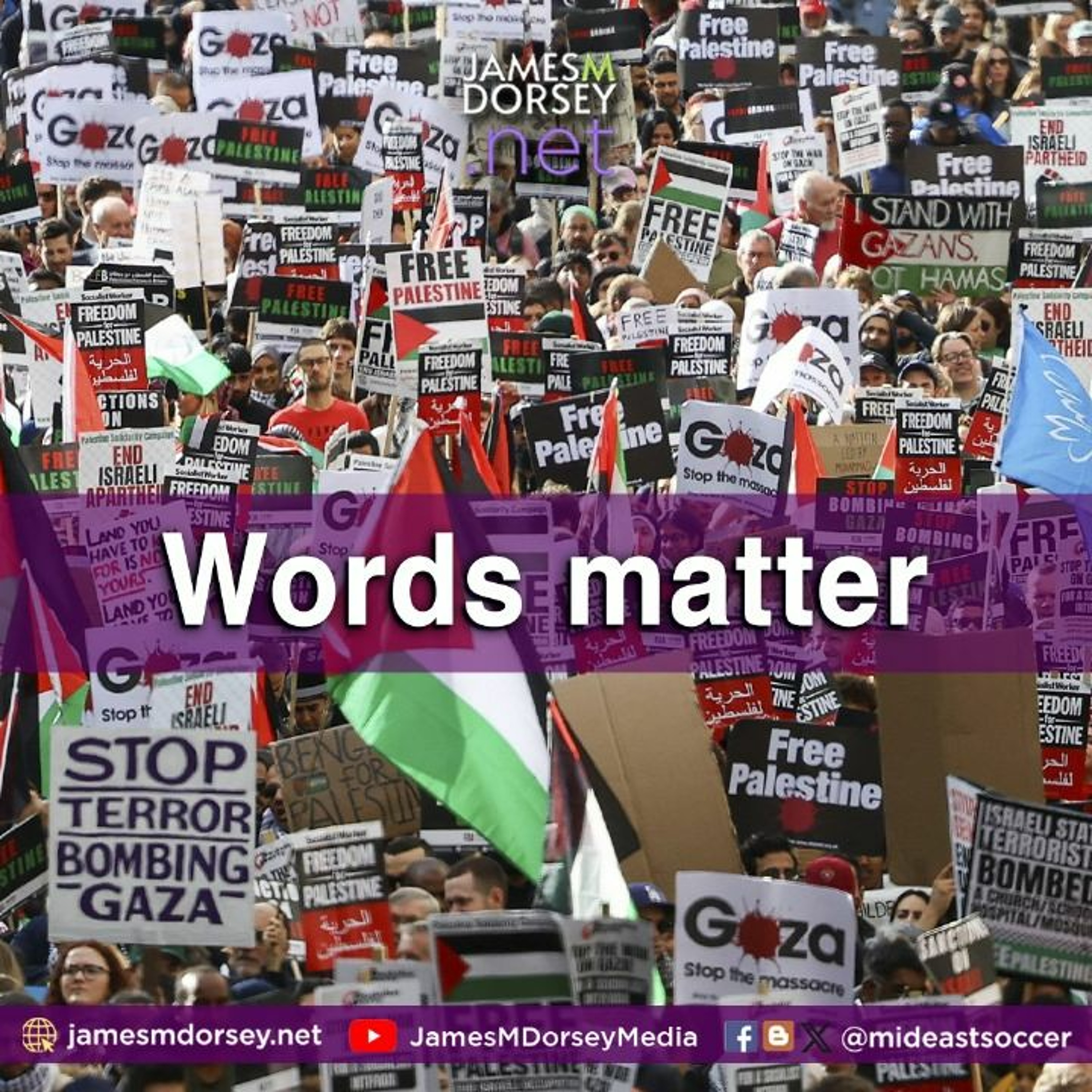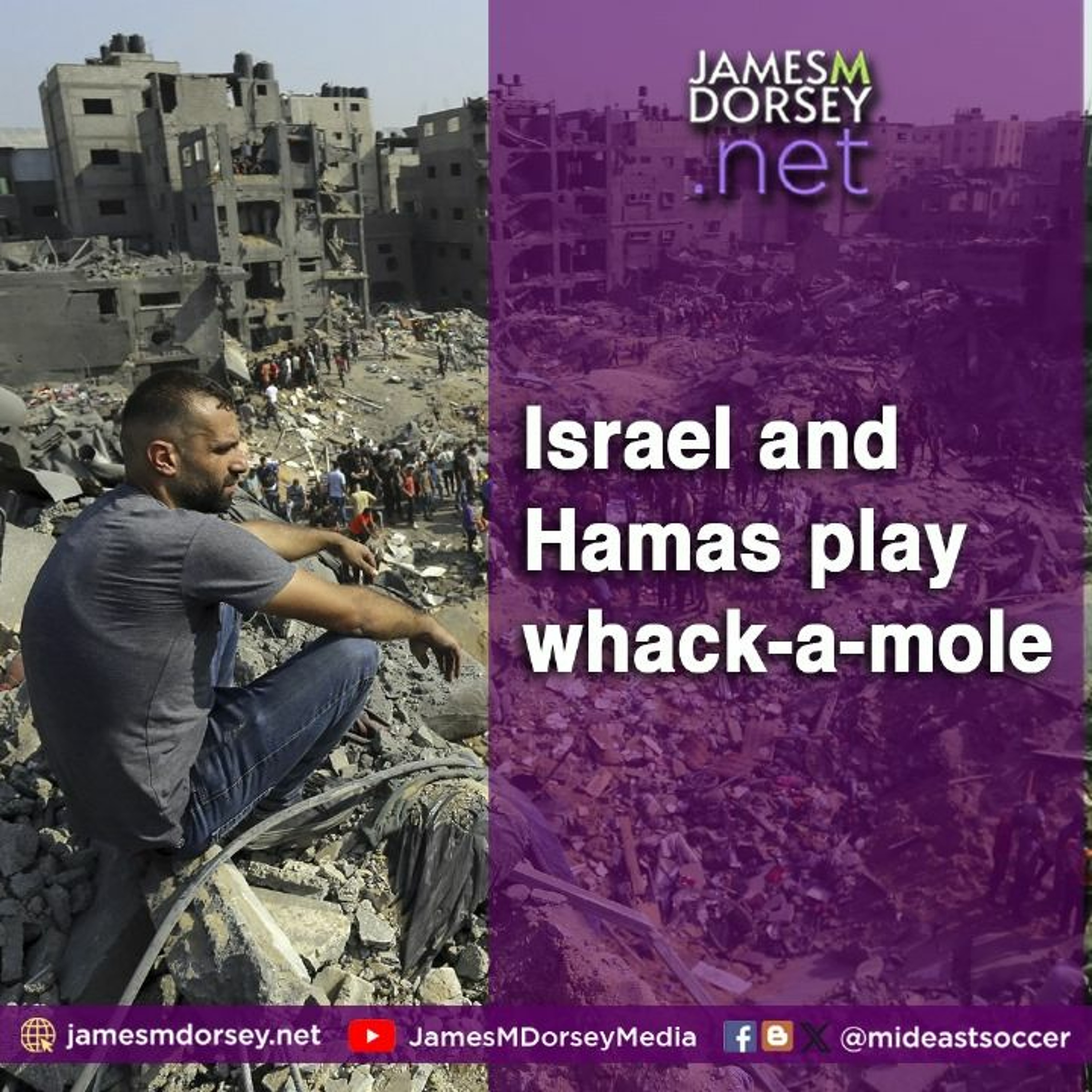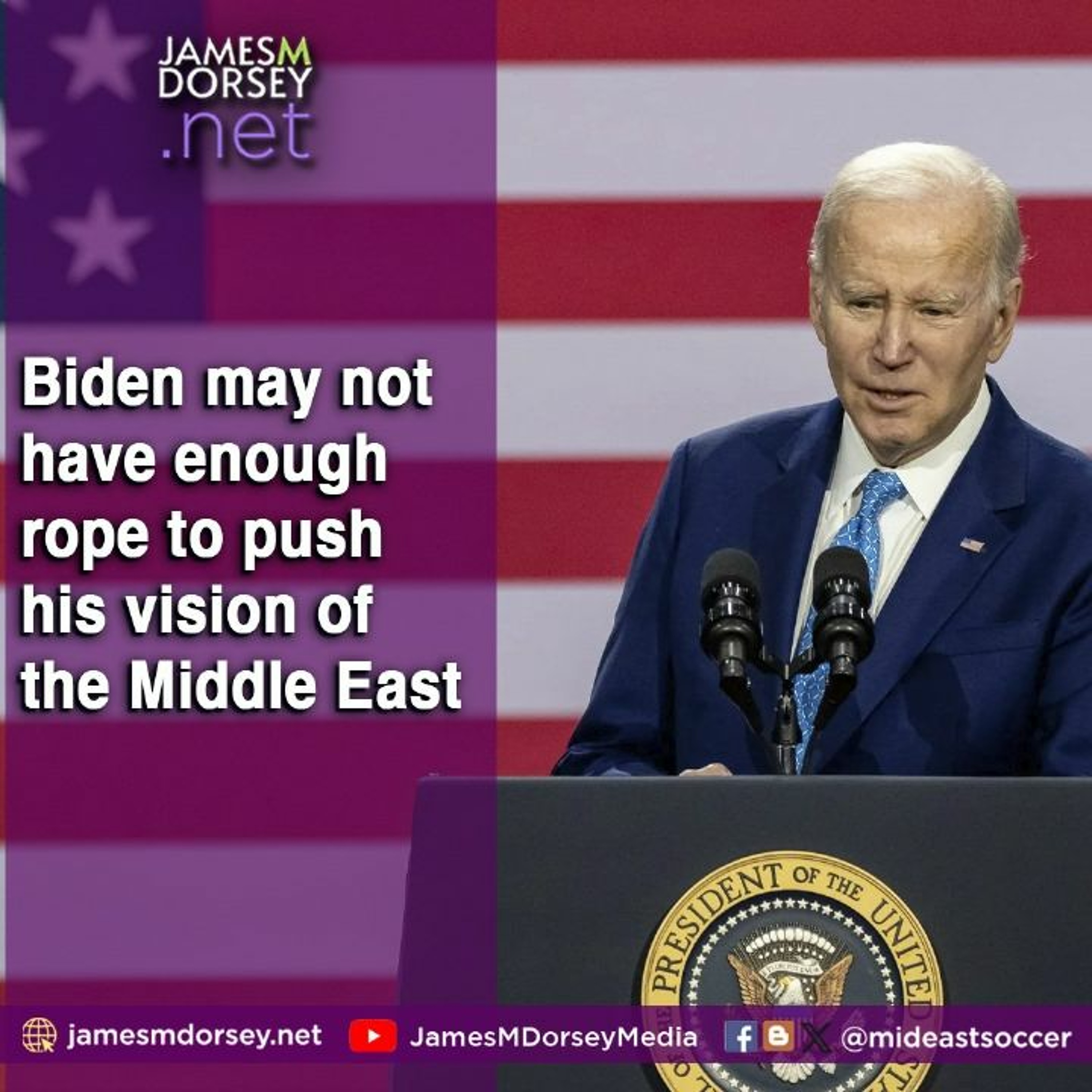Discover The Turbulent World with James M. Dorsey
The Turbulent World with James M. Dorsey

The Turbulent World with James M. Dorsey
Author: James M. Dorsey
Subscribed: 37Played: 2,152Subscribe
Share
© All rights reserved
Description
Dr. James M. Dorsey is a senior fellow at the S. Rajaratnam School of International Studies, co-director of the University of Würzburg’s Institute for Fan Culture, and co-host of the New Books in Middle Eastern Studies podcast. James is the author of The Turbulent World of Middle East Soccer blog, a book with the same title as well as Comparative Political Transitions between Southeast Asia and the Middle East and North Africa, co-authored with Dr. Teresita Cruz-Del Rosario and Shifting Sands, Essays on Sports and Politics in the Middle East and North Africa.
655 Episodes
Reverse
Words matter.
In the Israeli-Palestinian battle of narratives, they, more often than not, either are designed to thwart solutions or, by design or default, reinforce entrenched mutually exclusive positions.
Multiple overt and covert wars have pushed the Middle East to the edge of a cliff.
Increased tension between Iran and Israel complicates efforts to pull the Middle East back from the abyss.
The Gaza ceasefire negotiations have all but broken down, with Israel and Hamas pursuing mutually exclusive goals.
Despite its devastating human and physical cost, Israel’s effort to destroy Hamas has a whack-a-mole aspect.
Israeli Prime Minister Binyamin Netanyahu is tying himself up in knots as he grudgingly, and only to a limited degree, bows to US President Joe Biden’s demands.
In doing so, Mr. Netanyahu is puncturing Swiss-cheese size holes into Israel’s Gaza narrative, making it easier for Mr. Biden to take him publicly to task.
The Greater Middle East is a ticking time bomb.
Generations in war-wracked Palestine, Syria, and Yemen have little, if anything, to look forward to. Moreover, discontent is mounting and could explode anytime in countries like Jordan, Egypt, and Iran.
Three recent attacks on Israelis shine a spotlight on the 35,000-member Palestinian security forces that the United States, Gulf countries, and much of the international community want to see in charge of on-the-ground security in post-war Gaza.
Israeli Prime Minister Binyamin Netanyahu clutches at straws as he seeks to increase the flow of humanitarian aid into Gaza while attempting to create building blocks for a compliant post-war Palestinian administration of the Strip.
Gaza’s population of 2.3 million are pawns in a cynical battle for control of post-war Gaza.
Israel’s refusal to lift restrictions on the unfettered entry into Gaza of food, medical supplies, and other desperately needed humanitarian goods, has less to do with a stand-alone starvation policy and more with who controls distribution in the Strip.
Both Israel and Hamas see control of aid distribution as a building block of who comes out on top once the guns fall silent.
Israeli Prime Minister Binyamin Netanyahu’s walls are caving in.
Mr. Netanyahu’s multiple battles fall into two categories: keeping his increasingly fragile government in place and fighting a war he has already lost in the court of public opinion and possibly on the ground in Gaza if measured by the prime minister’s war goals.
The besieged Gazan city of Rafah is Israeli Prime Minister Binyamin Netanyahu’s yo-yo.
A brilliant but ruthless politician, Mr. Netanyahu is in campaign mode.
“The man is in the midst of an election campaign, Rafah is a marketing tool and (the Americans) are the whipping boy,” said Israeli columnist Yossi Verter.
A just-published Palestinian public opinion survey offers pointers for what a successful transition from the devastating Gaza war to a resolution of the Israeli-Palestinian conflict will have to entail.
One just has to switch on the news to realize that mercenaries and private military companies live a life of their own and shape headlines.
Chaos and mayhem dominate the streets of Haiti after Colombian mercenaries killed the president. Russia's Wagner Group played a key role in the invasion of Ukraine and at one point appeared to revolt against President Vladimir Putin. This is just to name a few recent histories shaping events.
The irony is that the latest phase in the evolution of mercenaries and private military entities first emerged in the Middle East, a region racked by wars and conflict in which states like the United States, Russia, Iran, Saudi Arabia, the UAE, Qatar and Turkey backed armed to the teeth, non-state actors of different stripes.
A historian and political scientist at South Carolina's Clemson University, Arash Azizi argues that Iran may be on the cusp of change. It's just that the change may come from within the regime rather than from the street.
This year’s US presidential elections are not the only potential hurdle confronting President Joe Biden’s multi-pronged vision for a Middle East peace once the Gaza war ends.
So is Israeli intransigence, the prospect of a long-term insurgency in post-war Gaza, and increasing Saudi Chinese technological cooperation.
Failed efforts to achieve a Gaza ceasefire on the eve of Ramadan leave innocent Gazans in the lurch, highlight the gap between Israel and Hamas’ demands in negotiations, and raise the stakes for the United States.
The Gaza war has turned Palestine into a lightning rod for mounting frustration and discontent in Arab autocracies such as Egypt, Jordan, Tunisia, Algeria, and Morocco.
A long-standing Israeli-Palestinian battlefield, food has moved centre stage.
For Gazans, who are on the verge of starvation, the food fight is existential.
Two recent high-profile Arab events honouring Indonesia’s Nahdlatul Ulama, the world’s largest and most moderate Muslim civil society movement, highlight a subtle tug-of-war over who will define ‘moderate Islam’ in the 21st century.
A proposed temporary Gaza ceasefire and prisoner exchange appears designed to buy war-battered Gazans relief while enabling Israel and Hamas to claim a success.


























